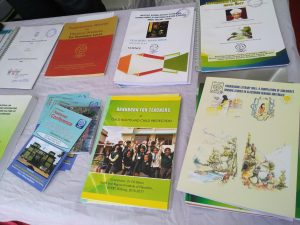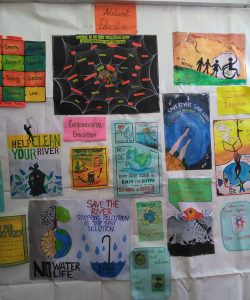NCERT Foundation Day: Showcasing the past, present and future
As a day-long event, NCERT celebrated its 58th Foundation Day showcasing its work across parallels in the education sector.
 M arking the 58th Foundation Day of National Council for Educational Research and Training (NCERT) recently at its New Delhi campus, the Council showcased the best from its past and ongoing initiatives. Various departments under the National Institute of Education and Regional Institutes of Education located at Bhubaneswar, Bhopal, Ajmer, Shillong and Mysuru, along with PSS Central Institute of Vocational Education, Bhopal, came together for the day-long event.
M arking the 58th Foundation Day of National Council for Educational Research and Training (NCERT) recently at its New Delhi campus, the Council showcased the best from its past and ongoing initiatives. Various departments under the National Institute of Education and Regional Institutes of Education located at Bhubaneswar, Bhopal, Ajmer, Shillong and Mysuru, along with PSS Central Institute of Vocational Education, Bhopal, came together for the day-long event.
Chief Guest Rina Ray, IAS, Department of School Education and Literacy, MHRD, Government of India, addressed the current and retired members of faculty of NCERT, teachers, teacher educators, students from B.Ed. Colleges, elementary teacher education institutes known as DIETs and students from the Regional Institutes of Education under the Council.
Department of Education in Arts and Aesthetics (DEAA), Department of Gender Studies (DGS), Department of Education in Social Sciences (DESS) and Department of Elementary Education (DEE) were some of the departments under the National region which put up stalls with their works.
Assistant Professor Harish Meena, National Population Education Project Cell, (NPEPC), Department of Education in Social Sciences, said, “Considering the growing need for adolescent education, a life-skills imparting module has been designed under NPEPC which provides three areas of intervention namely process of growing up, HIV and AIDS, and drug and substance abuse.”
“With NCERT as the coordinating agency, the Adolescence Education Programme (AEP) works through national agencies like Kendriya Vidyalaya Sangathan, Navodaya Vidyalaya Samiti and National Institute of Open School (NIOS).”
Highlighting issues of relationship with self, peer pressure, teenage pregnancy, child marriage among others that adolescents face, the module describes various activities including role-plays, discussions, exhibitions, and art and craft. It prescribes that such activities could be made a part of regular periods as well as morning assemblies or annual functions in schools so that such concerns are timely addressed.
“Science teachers were the only ones who used to come previously for this module but over a period of time, social science, physical education and even music and dance teachers have appreciated this module and have integrated it into their curriculum,” Meena told Delhi Post showcasing the stall while highlighting that the 2012-module for teachers teaching the secondary classes has been received well by teachers and parents.
MHRD’s initiative, Kala Utsav, which aims to promote arts in education across school students in the secondary stage, for class 9-12th also saw various books and materials on display on themes of theatre and traditional art forms. An Arts faculty from NCERT, while mentioning that a book on music will be out this year, told Delhi Post, “Subject-specific books are important but so is the culture all around us that needs to be highlighted as part of inclusive education for one and all. Arts are the beacon of such inclusive education.”
In the context of arts education, the initiative is guided by recommendations of the National Focus Group Position Paper No. 17 which highlights Arts, Music, Dance and Theatre for the National Curriculum Framework – 2005 and by the report of Central Advisory Board on Education (CABE) on integration of culture education in school curriculum.
“At a stall showcasing the National Achievement Survey conducted for classes 3,5 and 8 back in 2017 and for Class 10 in February, this year, Professor Indrani Bhaduri told Delhi Post that there has been a “paradigm shift” in the survey since it began in 2001.”
 The professor apprised Delhi Post, “We have been conducting the National Achievement Survey since 2001. But when we did it in 2017, we made a paradigm shift. We shifted from only content-based to competency-based survey as well, which helps understand the child’s actual comprehension rather than rote-learning or plain memorisation. Critical thinking skills of the child come into play with analysis and synthesis.”
The professor apprised Delhi Post, “We have been conducting the National Achievement Survey since 2001. But when we did it in 2017, we made a paradigm shift. We shifted from only content-based to competency-based survey as well, which helps understand the child’s actual comprehension rather than rote-learning or plain memorisation. Critical thinking skills of the child come into play with analysis and synthesis.”
Meanwhile, the RSMA Project Cell, NCERT, under the Rashtriya Madhyamik Shiksha Abhiyan (RMSA), which looks after the equity and quality aspects of secondary education, has been developing various In-service Teacher Professional Development Packages for teachers of the secondary stage in social or generic concerns like inclusion, gender and assessment along with subject-specific areas such as Languages like English, Hindi, Sanskrit and Urdu as well as subjects like Mathematics, Science and Social Science.
Faculty from RMSA, NCERT told Delhi Post, “After the success of Sarva Shiksha Abhiyan which achieved substantial retention of school-going children, the RMSA focuses on quality education for the ninth and tenth classes considering the need for universalisation of secondary education.”
Department of Education in Languages displayed its work focussing on philosophy of multilingualism in school education.
New publications of NCERT were released by Secretary Education who praised the work undertaken by NCERT. Earlier, Professor H.K. Senapaty, Director, NCERT welcomed the chief guest and gave a brief overview of NCERT’s work and stressed on the need for setting up one institute in each state to meet the demands of every state.
“Publications of faculty members’ works, reports and proceedings throughout the year as well as various books, resources and materials were on display at the function.
Few students pursuing their under graduation from Regional Institute of Education, Mysuru, Namita, Natasha and Kritika spoke to Delhi Post about the Institute’s work and showcased various hand-made posters by the students on inclusive education, adolescent education and environmental education.
The function also witnessed various cultural programmes throughout the day.
